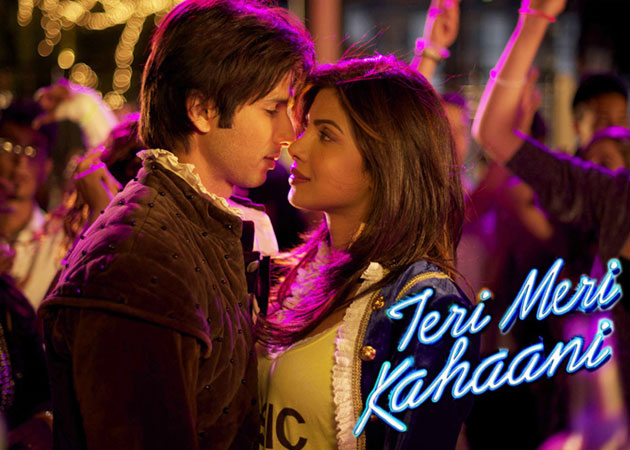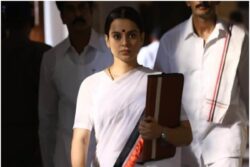Review: Teri Meri Kahaani

Cast: Shahid Kapoor, Priyanka Chopra and Prachi Desai
Director: Kunal Kohli
Whose story, make that stories, and to what real end? That is the question that Teri Meri Kahaani leaves the audience with. The answer isn’t even worth looking for.
A tale of love and passion that straddles three different eras, the film resorts to much trans-migratory mumbo-jumbo in trying to establish that an amorous bond of minds and souls survives the cycle of life and death and regenerates itself with every birth. Wow!
It is unlikely that the rather soulless Teri Meri Kahaani will last beyond the first week in the multiplexes. The film is only two hours long and yet it trudges down its hazy path rather sluggishly and, worse still, goes nowhere in particular.
We saw something thematically similar but qualitatively removed in celebrated Taiwanese filmmaker Hou Hsiao-Hsien’s delectably crafted 2005 masterpiece, Three Times.
Its three separate love stories, featuring the same pair of actors, were set in 1911, 1966 and the present.
Is it a mere coincidence that the Teri Meri Kahaani triptych also takes place in 1910, 1960 and the present? Or does director Kunal Kohli possess a sixth sense that nobody is aware of?
Whatever the truth, and no matter how pedestrian Kohli’s effort may basically be, Teri Meri Kahaani can be described as rather harmless fun, if you are in a generous mood and can take its convoluted ways with more than a fistful of salt.
Shahid Kapoor and Priyanka Chopra, who hog the footage three times over, are perfectly at ease in all the incarnations that they are called upon to flesh out.
The trouble is that the separate time zones, despite the attempts to differentiate the backdrops through the use of altered colour schemes and culture-specific musical sounds, do not quite stand out as distinct milieus. Teri Meri Kahaani is flat and fluffy for the most part, despite cinematographer Sunil Patel’s best efforts.
There is a Shankar Jaikishan-style number to reflect the 1960s, with the hero assuming the well-loved Shammi Kapoor persona.
The present times are marked by online chats, social networking sites, smartphones, iPads, and a song that has English lyrics. What’s more, the lovebirds prance to a Hindi film song in Globe Theatre. Our apologies, Shakepeare!
The pre-Independence part of the film, set in Punjab, has the mandatory Sufi number plus a robust Bhangra-inspired set piece. Utterly unimaginative!
The film opens in an early 1960s Poona-to-Bombay rail coach. Wannabe musician Govind (Shahid Kapoor) bumps into movie star Ruksar (Priyanka Chopra). Sparks fly. Cupid strikes.
Another girl (Prachi Desai), Govind’s neighbor in a guest house, develops a soft corner for the guitar-strumming boy. It turns out that the diva and the ordinary lass were childhood friends. So Govind and Ruksar’s love remains unrequited.
Jump to 2012, England. Krish Kapoor (Shahid) and Radha Chopra (Priyanka) run into each other in Stratford-upon-Avon. The boy is on the rebound – it’s his birthday and he has just broken up with his girlfriend, the highly demanding Meera (Neha Sharma).
Fertile ground for another love affair too bloom, but it’s just as abortive. Meera strikes back: she posts Krish’s private photos on a social networking site. Radha blows her fuse. Poor old Krish is left in the lurch yet again.
Teri Meri Kahaani gives the male protagonist another life and another chance to get things right. This time around the film travels all of a century back in time to Sargodha village, Lahore.
In the bucolic Punjab setting, sprightly, poetry-spouting Muslim wastrel Javed Quadri (Shahid again) chases every pretty girl he knows in the village, be it Parminder Kaur or Pamela Jones.
He falls in true love only when he is saved from a British official’s guards by Aradhana (Priyanka), daughter of a nationalist Sikh.
Fate intervenes here too. In order to impress the girl, Javed humiliates a British security officer and ends up in jail. By the time he is freed three months later, Aradhana has been wedded off to a man more to her no-nonsense father’s liking.
So there we go – back to square one. Teri Meri Kahaani is pretty much like the loves of the film’s male protagonist – it pours out all it has. But what it has simply isn’t enough.









